Perlite and vermiculite are well-known soil amendments that can significantly improve the quality of your vegetable garden. Both these materials provide numerous benefits to the soil and plants, enhancing their overall health and productivity. Below we learn about vermiculite vs perlite, the benefits of using perlite or vermiculite on house plants, how much vermiculite or perlite to add to the soil, and the perlite/vermiculite mix ratio.

Benefits of Perlite and Vermiculite in Vegetable Garden
What are Perlite and Vermiculite?
Perlite is a natural volcanic glass formed when obsidian (volcanic glass) is rapidly cooled with water. This process results in a porous, lightweight material that is well-suited for use as a soil amendment. On the other hand, vermiculite is a naturally occurring mineral that is connected to mica in a very close way. It is formed through the weathering and alteration of biotite and phlogopite, two types of mica. When heat exposure, vermiculite expands and forms a lightweight, highly absorbent material.
Improving Soil Structure
Both perlite and vermiculite can significantly improve soil structure, essential for a healthy vegetable garden. They work by increasing the air and water-holding capacity of the soil, preventing compaction, and promoting proper drainage. This, in turn, ensures that plant roots have access to the necessary oxygen and water required for growth.
Perlite is known for its excellent aeration properties. Its porous nature creates air pockets within the soil, improving aeration and preventing compaction. Conversely, Vermiculite is highly absorbent and can hold large amounts of water, thus maintaining consistent moisture levels within the soil.
Enhancing Root Growth
The improved soil structure of perlite and vermiculite creates promotes healthy root growth. The increased aeration and drainage provided by perlite encourage the development of robust root systems, while the water retention properties of vermiculite ensure that roots have consistent access to moisture. Moreover, the lightweight nature of both perlite and vermiculite reduces soil compaction, enabling roots to penetrate the soil more easily. This leads to stronger, more extensive root systems and healthier, more productive plants.
Encouraging Microbial Activity
Perlite and vermiculite also support the growth of beneficial microorganisms in the soil. These microorganisms play a vital role in the overall health of your vegetable garden, as they help break down organic matter, fix nitrogen, and release essential nutrients for plant uptake. The increased aeration and moisture retention provided by perlite and vermiculite create the ideal environment for these beneficial microorganisms to thrive. As a result, your vegetable garden will benefit from increased nutrient availability and improved nutrient cycling.
Insulating Properties
Both perlite and vermiculite possess excellent insulating properties that can benefit your vegetable garden. They help regulate soil temperature, protecting plant roots from extreme temperature fluctuations. During hot weather, the insulating properties of perlite and vermiculite can help prevent the soil from overheating, which can damage delicate root systems. Similarly, they can help maintain a more stable soil temperature in colder weather, reducing the risk of frost damage to your plants.
In case you missed it: A Guide to Using Vermiculite in Your Garden

Pest and Disease Resistance
By improving soil structure and promoting healthy root growth, perlite, and vermiculite can also help your vegetable garden resist pests and diseases. Healthy plants with strong root systems are less susceptible to pest infestations and more disease-resistant. Moreover, the improved drainage provided by perlite can help prevent the development of root rot and other fungal diseases, which often thrive in waterlogged soils.
pH Neutral
Both perlite and vermiculite are pH neutral, meaning they will not significantly affect the acidity or alkalinity of your soil. This is important because many vegetables require a specific pH range to grow and produce optimally. By using these soil amendments, you can ensure that the pH balance of your soil remains consistent, providing the ideal environment for your vegetable garden.
Versatility
Perlite and vermiculite are versatile soil amendments suitable for a wide range of gardening applications. They can be used in container gardens, raised beds, or traditional in-ground gardens, making them a valuable addition to any vegetable garden setup. Additionally, they can be mixed with other soil amendments like compost, peat moss, or coconut coir to create custom soil blends tailored to your specific gardening needs.
Seed Germination and Seedling Growth
Perlite and vermiculite can also improve seed germination and seedling growth. Mixing these amendments into your seed-starting mix provides a more optimal environment for germinating seeds and seedlings to develop. The improved aeration and moisture retention properties encourage faster germination and stronger seedling growth, leading to healthier, more vigorous plants.
Rooting Cuttings
Perlite and vermiculite can create a rooting medium that promotes successful root development when propagating plants from cuttings. Using a mix of perlite and vermiculite, you can provide the ideal balance of air and moisture necessary for forming new roots. Additionally, the lightweight nature of these amendments reduces the risk of damage to delicate root tissues, ensuring a higher success rate when rooting cuttings.
Reducing Soil Erosion
Perlite and vermiculite can help reduce soil erosion in your vegetable garden. Their lightweight nature and ability to retain moisture reduce the likelihood of soil particles being washed away during heavy rainfall. By incorporating these amendments into your soil, you can prevent the loss of valuable nutrients and maintain a stable growing environment for your vegetables.
Sustainability
Perlite and vermiculite are sustainable soil amendments derived from natural sources. They are both non-toxic, biodegradable, and environmentally friendly, making them an excellent choice for gardeners seeking to reduce their ecological footprint. By incorporating these amendments into your vegetable garden, you can contribute to a healthier environment while enjoying its numerous benefits.
Easy to Use
Incorporating perlite and vermiculite into your vegetable garden is a simple process. They can be mixed into your existing soil or added to your planting mix at a ratio of up to 25% by volume. A ratio of 10-20% perlite or vermiculite is generally recommended for container gardens.
In case you missed it: Discover 20 Budget Friendly DIY Garden Ideas: Cheap Ways to Create Your Own Garden

Conclusion
In summary, perlite and vermiculite offer numerous benefits to vegetable gardens, making them invaluable additions to any gardener’s toolkit. Moreover, their pH neutrality, versatility, sustainability, and ease of use make them ideal for various gardening applications. Add perlite and vermiculite to your vegetable garden to experience these amendments’ advantages.
- Feed Your Flock for Less: Top 10 Tips to Save on Chicken Feed
- Ultimate Guide to Ossabaw Island Hog: Breeding, Raising, Diet, and Care
- Hatching Answers: The Top 10 Reasons Your Chickens Aren’t Laying Eggs
- Eggs and Economics: Breaking Down the Cost of Raising Backyard Chickens
- Defend Your Greens: Proven Methods to Keep Iguanas Out of Your Garden
- Ultimate Guide to Cinnamon Queen Chicken: A Comprehensive Guide for Beginners
- Ultimate Guide to California Tan Chicken: Breeding, Raising, Diet, Egg-Production and Care
- Ultimate Guide to Marsh Daisy Chicken: Breeding, Raising, Diet, and Care
- 10 Types of Chicken Farming Businesses You Can Start for Profits